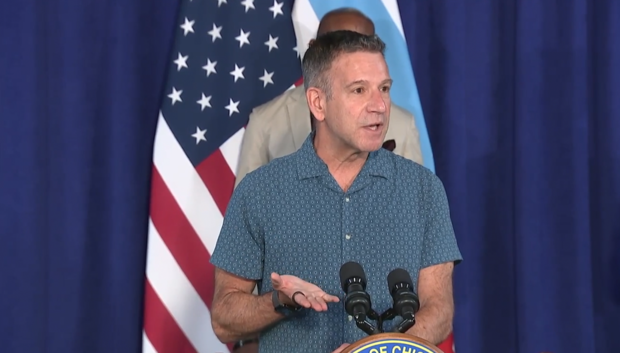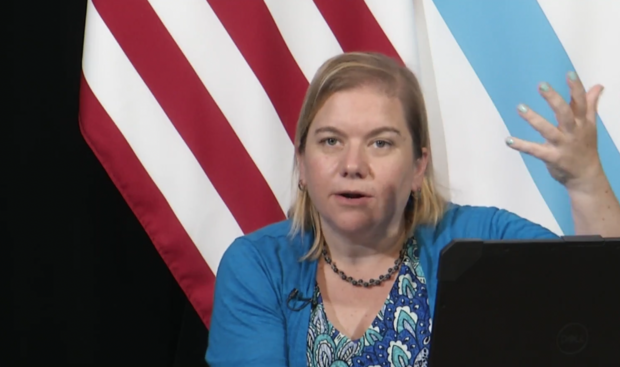CHICAGO (CBS) — Illinois neared 1,000 monkeypox cases on Friday, with 999 confirmed cases. Give other states have hit the 1,000-case milestone since the U.S. outbreak started in May.
Illinois has had more monkeypox cases than either Portugal, which has 810 cases, or Italy, which has 714 as of Friday morning, according to data from the World Health Organization.
But even as the U.S. reached more than 16,900 cases – the most in the world – Chicago has seen the rate of new cases slow, with only 113 new cases last week, down from a peak in late July where there were nearly 141 new cases in a week, according to data from the Chicago Department of Public Health.
“[It’s] too early to say things look really good, but definitely some signs of slowing of cases,” said Dr. Allison Arwady, Chicago’s public health commissioner on Tuesday during a Facebook livestream. “The good thing is we’re not seeing the potentially exponential growth that we were seeing early on. So that is reassuring.”
Chicago has 807 cases as of Friday morning, and makes up more than 80% of the cases in the state. Other cities such as New York and Los Angeles have also seen modest declines in new cases. New York, California, Florida, Texas, and Georgia all have more than 1,000 reported monkeypox cases.
“Illinois is the fifth largest state, and we’re the sixth in terms of MPV cases. So not unexpected there,” Arwady said.
!function(){"use strict";window.addEventListener("message",(function(e){if(void 0!==e.data["datawrapper-height"]){var t=document.querySelectorAll("iframe");for(var a in e.data["datawrapper-height"])for(var r=0;r<t.length;r++){if(t[r].contentWindow===e.source)t[r].style.height=e.data["datawrapper-height"][a]+"px"}}}))}();
The slowdown in cases comes nearly three weeks after Chicago hosted Market Days, the annual LGBT street festival, which attracted crowds of more than 100,000 people, including travelers from other states and countries.
Organizers and city officials tamped down concerns for allowing the festival to go through as monkeypox cases swelled in Chicago, holding a press conference before the event kicked off.
Market Days chairperson Mark Liberson was at that press conference alongside community health organizers, and he told reporters that you’re not going to get the virus at a street fair.
“One of the things that [Arwady] spoke to was the safety of going to a festival. And she was proven correct,” Liberson said.
He credited the vaccination efforts by the health department and community partners in helping to curb cases.
“The bottom line is that people were aware of the primary method of transmission and acted to protect themselves,” Liberson said.
“Hopefully more people will take advantage of getting vaccinated at this point.”
The concerns around the event stem from Chicago’s earlier role in the U.S. monkeypox outbreak, after several cases were linked to the International Mr. Leather (IML) conference at the end of May. Gov. JB Pritzker eventually declared a public health emergency earlier this month, when there were nearly half as many cases.
The outbreak drew parallels to ones seen with COVID-19.
Mayor Lori Lightfoot and Arwady came under fire for allowing Lollapalooza to happen last year amid high COVID-19 cases. Chicago would ultimately see 203 cases linked to that event.
Arwady was diagnosed with COVID-19 for the first time on Thursday.
The U.S averaged nearly 337 new monkeypox cases on Wednesday, down from a peak of 444 cases in Aug 10, according to an CBS 2 analysis of data from the Centers for Disease Control and Prevention.
!function(){"use strict";window.addEventListener("message",(function(e){if(void 0!==e.data["datawrapper-height"]){var t=document.querySelectorAll("iframe");for(var a in e.data["datawrapper-height"])for(var r=0;r<t.length;r++){if(t[r].contentWindow===e.source)t[r].style.height=e.data["datawrapper-height"][a]+"px"}}}))}();
In Illinois, there were 135 cases the week of Aug. 21, down from a peak of 189 cases the week of Aug. 7, according to data from the Illinois Department of Public Health.
Howard Brown Health, a nonprofit LGBTQ healthcare and social services provider, diagnosed 36% of all Illinois cases.
“During the first 10 weeks of us tracking our data, we saw an increase in our cases. And actually, in the last two weeks, we have seen a decrease in both the number of positives as well as the percent positive,” said Laura Rusie, director of data, evaluation and epidemiology at Howard Brown. “So while only two weeks, it’s hard to say that that’s necessarily a trend that will hold, but it’s promising data that we might be seeing a decrease in incidents.”
Rusie said, while Chicago is seeing a decrease in monkepox cases, Chicagoans shouldn’t lose sight of the people that might not be represented in the data yet.
“We need to be mindful of making equitable access to testing and vaccines,” she said.
The administration of the JYNNEOS vaccine is still being limited to men who have sex with other men.
The U.S. Food and Drug Administration issued an emergency use authorization, permitting the vaccine to be administered by intradermal injection. That stretches the supply to five doses per vial.
Chicago has received more than 38,000 does, with 12,000 more coming in weeks, according to allocation data from the U.S. Department of Health and Human Services. As of Wednesday, approximately 25,500 doses have been administered to people in Chicago, according to a CDPH spokesperson.
IDPH issued guidance to schools on how to monitor for potential monkeypox cases, amid concerns about the virus shifting to young children. Three children in Georgia were diagnosed with monkeypox this week, according to CBS46.
Nationwide, there were 17 reported monkeypox cases in children 15 and younger, according to recently released CDC data.
There have been no reported monkeypox cases under the age of 18 in Chicago, according to CDPH data. The virus can be transmitted through direct contact with the infectious rash, scabs, or body fluids as well as intimate contact such as cuddling and sex.
Public health officials had to thread a needle on messaging for weeks to convey the possibility of getting it from touching versus the most common transmission that was occurring during sex –all while not stigmatizing men who have sex with other men.
So far, the virus has stayed mostly with men, with more than 90% of Chicago cases in men, including trans men. About 75% of cases were in those identifying as gay, lesbian or bisexual, according to CDPH data.
“We’re hearing that meeting people online is one of the biggest risk factors that people are reporting who turn out to be diagnosed with MPV, so that’s Grindr, Tinder, Scruff,” Ardwady said, referring to dating apps.
In addition to vaccinations, gay men have drastically changed behavior to safeguard against the virus by having less sex, according to a CDC survey of gay and bisexual men released this week. About half of respondents reduced the number of sexual partners and encounters, as well as sex from those met on dating apps.
“I want to thank folks who have gotten vaccinated want to thank folks who have been a little more careful with sexual contacts and who have generally been aware,” Ardwady said.
She said the city still had work to do on vaccinating Latino and Black Chicagoans.
“About 31% of our cases have been in Latino Chicagoans. And as of mid-last week, about 17% [of vaccines] had gone to Latino Chicago,” Ardwady said. “About 21% of our cases have been in Black Chicagoans, but only about 12% of the vaccines. So we’ve been doing some extra outreach.”
The city is hosting a monkeypox vaccine event in Austin on Friday, and will host two more at Wilbur Wright College and Richard J. Daley College on Saturday.
Source: ChicagoCBS




